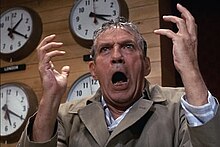Howard Beale (Network): Difference between revisions
added tl film stub |
rm the bullshit charged language, and more in line with the NPOV; it can be interpreted either way |
||
| Line 3: | Line 3: | ||
{{about|the fictional character from the movie [[Network (film)|Network]]|the American historian|Howard K. Beale|other uses|Howard Beale_(disambiguation)}} |
{{about|the fictional character from the movie [[Network (film)|Network]]|the American historian|Howard K. Beale|other uses|Howard Beale_(disambiguation)}} |
||
'''Howard Beale''' is a fictional character from the movie ''[[Network (movie)|Network]]'' (1976). He is played by [[Peter Finch]] |
'''Howard Beale''' is a fictional character from the movie ''[[Network (movie)|Network]]'' (1976). He is played by [[Peter Finch]], who won a posthumous [[Academy Award|Oscar]] for the role. |
||
In the movie, Beale struggles |
In the movie, Beale struggles to accept the ramifications of the social ails and depravity existing in the world he reports on; rather than give him the psychiatric assistance that some, like his friend Max Schumacher, believe he needs his producers use him as a tool for getting higher ratings. The image of Howard Beale, in a beige coat with his wet, gray hair plastered to his head, standing up during the middle of his newscast saying, "I'm as mad as Hell, and I'm not going to take this anymore!" ranks as one of the most memorable scenes in film history (the line made #19 on the [[American Film Institute]]'s [[AFI's 100 Years... 100 Movie Quotes|list of 100 great movie quotes]]). |
||
Beale's career as "The Mad Prophet of the Airwaves" is sparked by his half-joking offer, after receiving his two-weeks' notice, to kill himself on nationwide TV. He subsequently apologizes to his viewers, telling them he "ran out of [[bullshit]]". Viewers respond positively and Beale is given his own show where he can say whatever he likes. Unfortunately for the network, he exposes the ties between CCA, the corporation that owns the network, and business interests in Saudi Arabia. Arthur Jensen, CCA chairman and chief stockholder, thunderously |
Beale's career as "The Mad Prophet of the Airwaves" is sparked by his half-joking offer, after receiving his two-weeks' notice, to kill himself on nationwide TV. He subsequently apologizes to his viewers, telling them he "ran out of [[bullshit]]". Viewers respond positively and Beale is given his own show where he can say whatever he likes. Unfortunately for the network, he exposes the ties between CCA, the corporation that owns the network, and business interests in Saudi Arabia. Arthur Jensen, CCA chairman and chief stockholder, thunderously explains to him his belief that money is the only true god, whereupon Beale completely turns his message around; before, he told people their lives had value and meaning, but after his meeting with Jensen, he says the opposite. His ratings drop, but Jensen orders him kept on; network executives order him to be assassinated. The film concludes with the murder of Beale on national television; a voiceover proclaims him "the first known instance of a man who was killed because he had lousy ratings." |
||
{{DEFAULTSORT:Beale, Howard}} |
{{DEFAULTSORT:Beale, Howard}} |
||
Revision as of 02:58, 4 April 2010

Howard Beale is a fictional character from the movie Network (1976). He is played by Peter Finch, who won a posthumous Oscar for the role.
In the movie, Beale struggles to accept the ramifications of the social ails and depravity existing in the world he reports on; rather than give him the psychiatric assistance that some, like his friend Max Schumacher, believe he needs his producers use him as a tool for getting higher ratings. The image of Howard Beale, in a beige coat with his wet, gray hair plastered to his head, standing up during the middle of his newscast saying, "I'm as mad as Hell, and I'm not going to take this anymore!" ranks as one of the most memorable scenes in film history (the line made #19 on the American Film Institute's list of 100 great movie quotes).
Beale's career as "The Mad Prophet of the Airwaves" is sparked by his half-joking offer, after receiving his two-weeks' notice, to kill himself on nationwide TV. He subsequently apologizes to his viewers, telling them he "ran out of bullshit". Viewers respond positively and Beale is given his own show where he can say whatever he likes. Unfortunately for the network, he exposes the ties between CCA, the corporation that owns the network, and business interests in Saudi Arabia. Arthur Jensen, CCA chairman and chief stockholder, thunderously explains to him his belief that money is the only true god, whereupon Beale completely turns his message around; before, he told people their lives had value and meaning, but after his meeting with Jensen, he says the opposite. His ratings drop, but Jensen orders him kept on; network executives order him to be assassinated. The film concludes with the murder of Beale on national television; a voiceover proclaims him "the first known instance of a man who was killed because he had lousy ratings."
